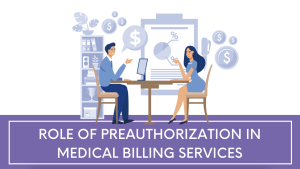Ensuring the smooth and efficient operation of medical billing processes is vital to the overall functioning of healthcare organizations. Authorization plays a pivotal role in this regard, serving as a crucial step that cannot be overlooked. This article delves into the significance of authorization in medical billing, shedding light on its vital role in expediting reimbursements, reducing claim denials, and maintaining compliance with regulatory standards. By understanding the importance of authorization, healthcare practitioners and billing professionals can streamline their operations, improve revenue cycles, and ultimately enhance patient care.
The Importance of Authorization in Medical Billing
Medical billing plays a crucial role in the healthcare industry, ensuring that healthcare providers receive the necessary payment for the services they provide. However, a key factor in this process is authorization. Authorization is the approval given by a patient’s insurance company or payer to proceed with medical treatment or services. In this article, we will delve into the various aspects of authorization in medical billing and highlight its significance in ensuring proper documentation, maintaining legal compliance, reducing payment delays, facilitating insurance reimbursement, preventing fraudulent activity, ensuring patient privacy, minimizing billing errors, streamlining the billing process, avoiding legal consequences, and establishing trust and credibility.
Ensuring Proper Documentation
Authorization is vital in medical billing as it ensures proper documentation. When a healthcare provider obtains authorization, it serves as evidence that the patient’s insurance company has reviewed and approved the specific treatment or service. This authorization can include details such as the type of service, the number of sessions or visits allowed, and the duration of the authorization. By documenting and maintaining accurate authorization records, healthcare providers can support their claims and demonstrate that the services provided were valid and necessary, minimizing the chances of claim denial or rejection.
Maintaining Legal Compliance
Authorization also plays a pivotal role in maintaining legal compliance in medical billing. Medical practices must adhere to various laws and regulations, such as the Health Insurance Portability and Accountability Act (HIPAA), which protect patient privacy and ensure the security of their health information. Obtaining proper authorization ensures that healthcare providers are collecting and sharing patient information in accordance with legal requirements. By obtaining explicit authorization from patients, healthcare providers can demonstrate their commitment to legal compliance, safeguarding patient data, and avoiding potential legal repercussions.
Reducing Payment Delays
One of the primary advantages of obtaining authorization in medical billing is the reduction of payment delays. Without proper authorization, insurance companies or payers may delay or deny claims, leading to delayed or reduced payment for healthcare services provided. By obtaining authorization upfront, healthcare providers can streamline the billing process and avoid unnecessary delays in reimbursement. This proactive approach not only ensures timely payment but also minimizes administrative burdens associated with appeals and resubmissions.
Facilitating Insurance Reimbursement
Authorization significantly facilitates insurance reimbursement for healthcare providers. Insurance companies and payers often require prior authorization for specific services or procedures to ensure the medical necessity of the proposed treatment. By obtaining prior authorization, healthcare providers can confirm that the services rendered are eligible for reimbursement. This simplifies the claims process, increases the likelihood of approval, and streamlines reimbursement, benefiting both healthcare providers and patients.
Preventing Fraudulent Activity
Authorization serves as a crucial deterrent against fraudulent activity in medical billing. Fraudulent billing practices can lead to significant financial losses and threaten the integrity of the healthcare system as a whole. By obtaining authorization, healthcare providers establish a necessary and documented proof that the services rendered were legitimate and conform to standard treatment protocols. This helps protect against fraudulent claims by ensuring that services are provided to patients who truly require them, safeguarding the healthcare system from abuse and ensuring that healthcare resources are efficiently allocated.
Ensuring Patient Privacy
Patient privacy is of utmost importance in the healthcare industry. Obtaining proper authorization ensures that healthcare providers collect and use patient information in a manner that respects their privacy rights. Without authorization, healthcare providers risk breaching patient confidentiality and violating HIPAA regulations. Properly documenting authorization not only demonstrates compliance with patient privacy laws but also fosters trust and confidence between patients and healthcare providers.
Minimizing Billing Errors
Authorization plays a significant role in minimizing billing errors. Accurate and complete documentation of authorization details, such as the services authorized and the length of the authorization, helps reduce the chances of errors in billing. By ensuring that all necessary authorization information is correctly captured in the billing process, healthcare providers can minimize the risk of incorrect billing codes or charges, ultimately improving billing accuracy and reducing the need for costly and time-consuming rework.
Streamlining the Billing Process
Obtaining authorization can streamline the entire medical billing process. By securing prior authorization, healthcare providers have a clear understanding of the services or procedures that are approved for reimbursement. This knowledge enables them to submit accurate and complete claims, avoiding time-consuming back-and-forth communications with insurance companies and payers. Streamlining the billing process through proper authorization helps healthcare providers optimize revenue cycles, improve operational efficiency, and ensure a smooth flow of financial resources within their practices.
Avoiding Legal Consequences
Failure to obtain proper authorization in medical billing can result in severe legal consequences. Non-compliance with authorization requirements can lead to claim denials, reduced reimbursement, or even lawsuits. Moreover, healthcare providers may face penalties or fines for breaching legal and regulatory requirements. By prioritizing authorization, healthcare providers can mitigate legal risks, safeguard their practice’s reputation, and focus on delivering quality care to their patients without the burden of legal ramifications.
Establishing Trust and Credibility
Authorization also plays a crucial role in establishing trust and credibility between healthcare providers and patients. Patients trust that their insurance companies and healthcare providers will work together to ensure they receive the appropriate treatment and services. By obtaining proper authorization, healthcare providers demonstrate their commitment to following established guidelines, prioritizing patient care, and maintaining transparency in the billing process. This commitment to authorization builds trust, encourages patient compliance with necessary procedures, and fosters positive patient-provider relationships.
In conclusion, authorization holds immense importance in medical billing for various reasons. From ensuring proper documentation and maintaining legal compliance to reducing payment delays and preventing fraudulent activity, authorization serves as a critical factor in the healthcare industry. It facilitates insurance reimbursement, protects patient privacy, minimizes billing errors, streamlines the billing process, and helps healthcare providers avoid legal consequences. Moreover, authorization is instrumental in establishing trust and credibility with patients, further enhancing the quality of care and patient satisfaction. It is evident that authorization is an integral component of medical billing, ensuring the smooth functioning of healthcare practices and the financial stability of healthcare providers.










